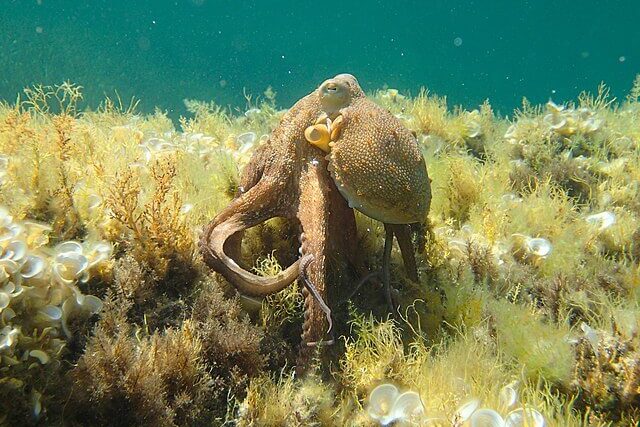
The proposed world’s first octopus farm has raised deep concerns among scientists over the welfare of the creatures. The farm in Spain’s Canary Islands is expected to raise around a million octopuses annually for food. This article will explore the implications of this farming proposal, examining the potential ethical and environmental concerns raised by critics, as well as the potential benefits of such a project.
The company behind the plans is Nueva Pescanova, a Spanish multinational that sent the confidential planning proposal documents to the Canary Islands’ General Directorate of Fishing. The proposal was leaked to the BBC by the campaign organisation Eurogroup for Animals. According to the documents, the octopuses would be raised in around 1,000 communal tanks in a two-storey building in the port of Las Palmas in Gran Canaria. They would be killed by being put in containers of water kept at -3C, a method that has been called “cruel” by some scientists.
Octopuses have never been intensively farmed before, and the prospect of intensively farming them has already led to opposition. Lawmakers in the US state of Washington have proposed banning the practice before it even starts. Currently, there are no welfare rules in place for octopuses, and some scientists have called the proposed method of slaughtering the octopuses using ‘ice slurry’ cruel.
The Aquaculture Stewardship Council (ASC), the leading farmed seafood certification scheme, is proposing a ban unless fish are stunned beforehand, as the use of ice slurry has been shown to result in poor fish welfare. Some supermarkets, such as Tesco and Morrisons, have already moved away from selling fish that have been killed using ice.
Jonathan Birch, associate professor at the London School of Economics, led a review of more than 300 scientific studies that showed that octopuses feel pain and pleasure. It led to them being recognised as “sentient beings” in the UK’s Animal Welfare (Sentience) Act 2022. Birch and his co-authors believe that high-welfare octopus farming is “impossible” and that killing in ice slurry “would not be an acceptable method of killing in a lab”. Campaign group Compassion in World Farming (CiWF), which has studied the plans, estimates that there will be “a mortality rate of 10-15%”.
In a statement to the BBC, Nueva Pescanova said: “The levels of welfare requirements for the production of octopus or any other animal in our farming farms guarantee the correct handling of the animals. The slaughter, likewise, involves proper handling that avoids any pain or suffering to the animal…” The company also claims to have achieved a level of “domestication” in the species, and that they do not “show important signs of cannibalism or competition for food”.
In the wild, octopuses are fiercely territorial agile hunters. Nueva Pescanova is proposing that the farmed animals be fed with industrially produced dry feed, sourced from “discards and by-products” of already-caught fish. The tanks would be filled with seawater piped in from an adjacent bay. The tanks would be different sizes for the different phases of the octopuses’ life, with the salinity and temperature closely controlled. The initial brood of 100 octopuses – 70 males and 30 females – would be taken from a research facility, the Pescanova Biomarine Centre, in Galicia, northern Spain.
Along with the welfare of the octopuses, CiWF has concerns around the wastewater produced by the farm, which would be pumped back into the sea. Octopuses produce nitrogen and phosphates as waste. “The water entering and leaving the plant will be filtered so that it will have no impact on the environment,” Nueva Pescanova said.
Around 350,000 tonnes of octopus are caught each year – more than 10 times the number caught in 1950 – which is putting pressure on populations. Nueva Pescanova stated that “aquaculture is the solution to ensuring a sustainable yield” and that it would “repopulate the octopus species in the future.” However conservationists believe farming them would lower the price, potentially creating new markets.
Nueva Pescanova emphasised to the BBC that it dedicated “great efforts to promote responsible and sustainable performance throughout the value chain to ensure that best practices are adopted.”
——————————————————————————
At Natural World Fund, we are passionate about stopping the decline in our wildlife.
The declines in our wildlife is shocking and frightening. Without much more support, many of the animals we know and love will continue in their declines towards extinction.
When you help to restore a patch of degraded land through rewilding to forests, meadows, or wetlands, you have a massive impact on the biodiversity at a local level. You give animals a home and food that they otherwise would not have had, and it has a positive snowball effect for the food chain.
We are convinced that this is much better for the UK than growing lots of fast-growing coniferous trees, solely to remove carbon, that don’t actually help our animals to thrive.
This is why we stand for restoring nature in the UK through responsible rewilding. For us, it is the right thing to do. Let’s do what’s right for nature!
Support our work today at https://naturalworldfund.com/ and join in the solution!

